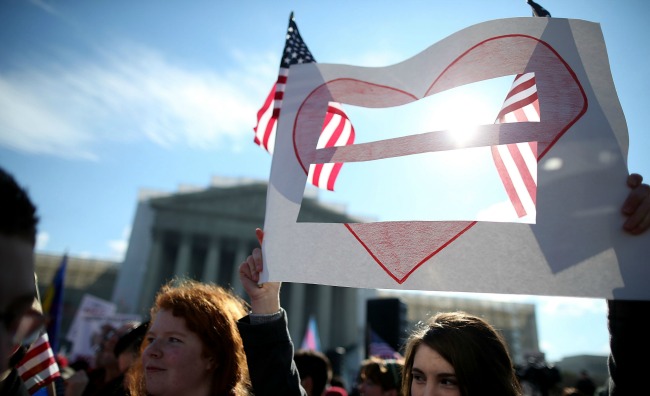
This post was updated June 25, 2013.
On Wednesday, the Supreme Court will hand down hotly anticipated verdicts on two cases related to gay marriage: a challenge to the Defense of Marriage Act, which denies federal marriage benefits to same-sex couples legally married in their states, and a challenge to California's Proposition 8, the November 2008 ballot initiative that banned same-sex marriage in that state.
Gay-marriage advocates are cautiously optimistic both cases will go their way. On DOMA, multiple lower-court judges, many of them Republican-appointed, have already ruled the 1996 law unconstitutional, and Supreme Court Justice Anthony Kennedy, thought to be the potential swing vote, seemed sympathetic to the anti-DOMA case during oral arguments in March.
There is considerably more uncertainty about how the Prop 8 case might turn out. That case was argued by the bipartisan team of Theodore Olson and David Boies, the Republican and Democrat superlawyers who opposed one another in Bush v. Gore. At a recent event sponsored by the center-left think tank Third Way, Boies discussed the many possible outcomes.
1. Gay Marriage for All! A lower court struck down Prop 8 on broad U.S. constitutional grounds, ruling that the gay-marriage ban violated equal protection and possibly due process. If the Supreme Court affirms this argument, it would make gay marriage legal nationwide, Boies said, "because, obviously, the Constitution applies to all 50 states."
2. Gay Marriage for California (Again)! A different lower court found Prop 8 unconstitutional on narrower grounds. Because the California Supreme Court made gay marriage legal in the state before Prop 8 made it illegal, the Ninth Circuit Court of Appeals said, in Boies' words, "once you grant rights to people, you can't take those rights away without due process." A decision on these grounds would restore gay marriage in California but leave other states unaffected.
3. Gay Marriage (and Civil Unions) for California! Another argument the court might buy is this: Since California already has civil unions for same-sex couples, there is no justification other than discrimination for barring them from describing those unions as "marriages," which they are in all but name. If the Supreme Court agrees with this argument, it would again make gay marriage legal only in California.
4. Get Outta Here! Prop 8 opponents made the technical argument that the proponents did not have legal standing to bring their case. California's governor and attorney general did not appeal the lower courts' rulings striking down Prop 8; it was activists who backed the law. "Do they have standing to come in and defend it? Under Supreme Court precedent, they probably do not," Boies said. "The Court has never granted standing to private citizens who do not have a fiduciary relationship to the state." If the Court rules this way, the lower court ruling overturning Prop 8 would stand, and gay marriage would be legal in California.
5. Never Mind! The Supreme Court could simply reverse its own decision to take up the case to begin with. This is rare, but it does occasionally happen. During oral arguments, Boies was surprised how many of the justices' queries seemed to question whether the timing was right to decide this issue. Such a move would again mean the appeals-court verdict is reinstated as the final word. Gay marriage would be legal in California.
6. No Gay Marriage for You! "There is one way we could lose," Boies said -- if the Court rules that the Prop 8 proponents do have standing and rejects all the constitutional arguments for gay marriage. Such a ruling would set a precedent that would make it more difficult to challenge other states' gay-marriage bans in court. "I certainly hope the court doesn't do that. I think there's no constitutional basis for it," he said. "But it is a possibility."